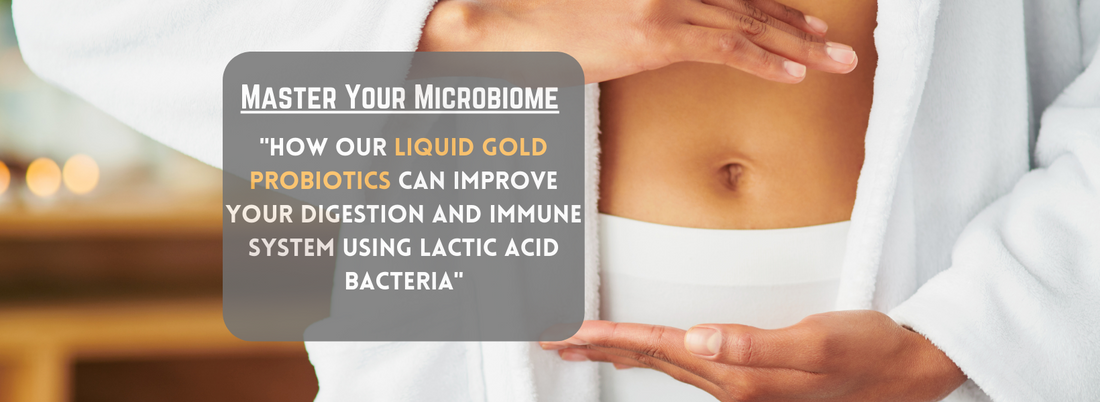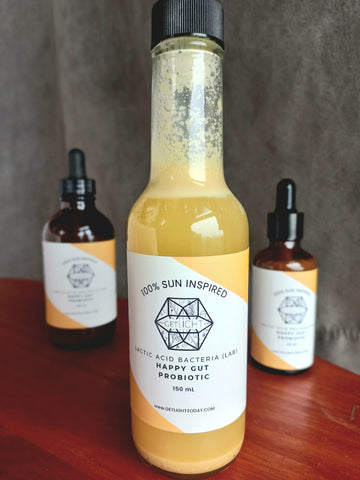At getLIGHT, we developed our Sun Inspired Probiotic Drink because we view Gut Health as an essential aspect of detoxification and regeneration and overall health and well-being. The importance of ingesting lactic acid bacteria (LAB) cannot be overstated. LAB are beneficial microorganisms that live in the gut and play a crucial role in maintaining the balance of the gut microbiome. The gut microbiome is responsible for many important functions, including digesting food, absorbing nutrients, and protecting the body from harmful microorganisms.
Lactic acid bacteria also play a vital role in boosting the immune system. They help to stimulate the production of white blood cells, which are responsible for fighting off infection and disease. They also help to regulate the inflammatory response, which is important for preventing chronic inflammation and autoimmune disorders.
In addition to its immune-boosting properties, lactic acid bacteria also promote healthy digestion by helping to break down food and absorb nutrients. They produce enzymes that aid in the digestion of carbohydrates, proteins, and fats. They also help to regulate the production of stomach acid and enzymes, which is important for maintaining proper digestion.
5 Reason Lactic Acid Bacteria Will Change Your Life
Improved gut barrier function. LAB help to strengthen the gut lining, which can prevent harmful substances from crossing into the bloodstream and causing inflammation.
Weight management. LAB can help to regulate appetite and metabolism, which can lead to weight loss and improved weight management.
Reduced risk of certain diseases. LAB can help to reduce the risk of certain diseases such as irritable bowel syndrome (IBS), inflammatory bowel disease (IBD), and certain types of cancer by regulating the gut microbiome.
Improved mental health. LAB can help to improve mental health by regulating the gut microbiome, which is connected to the brain through the gut-brain axis. A healthy gut microbiome can lead to improved mood and reduced risk of mental health issues such as anxiety and depression.
Increased resistance to antibiotics/dis-ease/bacterial infections. LAB can help to increase resistance to antibiotics by promoting the growth of beneficial microorganisms in the gut. This can help to prevent the overgrowth of harmful microorganisms that can lead to antibiotic resistance.
Probiotics vs Fermentation
When it comes to food, fermentation is often overlooked as a means of preserving and enhancing its nutritional value. However, unfermented foods may be contaminated with pesticides, fungus, and other harmful substances that can affect our health. Additionally, grains, flours, and starches contain anti-nutrients such as phytates that can be difficult for the body to digest, break down, and assimilate (4).
This is where Lactic Acid Bacteria (LAB) comes in. LAB are a beneficial microorganism that can be used as a ferment starter to convert sugars and starches into lactic acid, neutralizing inorganic contaminants, and toxins such as pesticides and fungus, in the process. LAB breaks down anti-nutrients such as phytates and improves the bioavailability of nutrients such as minerals and B-vitamins, making the food more easily digestible (5).
Not only does fermentation improve the nutritional value of food, but it also improves the taste and texture, and increases the probiotic content of the food (6).
At getLIGHT, we have harnessed the power of LAB to create our Sun Inspired Probiotic Drink, a highly potent and effective probiotic supplement that can help improve digestion, boost the immune system, and promote overall well-being.
Restoring Your Gut Microbiome: How Long Does it Take?
You may ask yourself, what happens once you start taking our LAB Liquid Gold. Here's a breakdown of what happens within the body after taking LAB for different periods of time:
1 Day. After taking L.A.B for one day, the beneficial bacteria will start to colonize in the gut, which can lead to a change in the gut microbiome. Some studies have shown that the supplementation of probiotics can lead to a significant increase in the number of beneficial bacteria in the gut.
1 Week. After taking L.A.B for one week, the beneficial bacteria will have colonized and started to establish themselves in the gut. This can lead to an improvement in the balance of the gut microbiome, which can have positive effects on overall health and well-being and according to studies, may improve digestion and reduce bloating and gas (1).
1 Month. After taking L.A.B for one month, the beneficial bacteria will have become well established in the gut, and the gut microbiome will have become more balanced. This can lead to a reduction in inflammation, improved digestion, and a stronger immune system due to the increased number of beneficial microorganisms in the gut and improvement in gut barrier function (2).
3 Months. After three months of taking LAB, the gut microbiome has become well-established, and the health benefits are even more pronounced. The gut microbiome regulates the immune system, and a healthy gut microbiome can help to reduce the risk of infections and inflammatory response, such as inflammatory bowel disease, abdominal pain and diarrhea (3).
If you're looking to take control of your health, try getLIGHT's Probiotic Drink today and experience the difference for yourself! Use the code, MICROBIOME to get 15% off our Probiotics.
References:
- Pinnamaneni, S., et al. (2016). Effects of a 7-day course of probiotic treatment on gut health and physical performance. Journal of Functional Foods, 23, 308-319.
- de Moreno de LeBlanc, A., et al. (2009). A randomized, double-blind, placebo-controlled trial of two probiotic strains in interleukin 10 knockout mice and undernourished children. International Journal of Food Microbiology, 137(1-2), 1-8.
- Rolfe, R.D., et al. (2000). Probiotic bacteria as biotherapeutic agents. Journal of Clinical Gastroenterology, 30(2), 114-121.
- "Fermentation as a means of preserving food" FAO. (n.d.). Retrieved from http://www.fao.org/fermentation-for-food-safety-nutrition/fermentation-as-a-means-of-preserving-food/en/
- "Fermented Foods as a Natural Source of Probiotics" National Center for Biotechnology Information. (2018). Retrieved from https://www.ncbi.nlm.nih.gov/pmc/articles/PMC5895324/
- "Lactic acid bacteria and their role in fermented foods" International Journal of Food Science & Technology. (2017). Retrieved from https://onlinelibrary.wiley.com/doi/abs/10.1111/ijfs.13373


